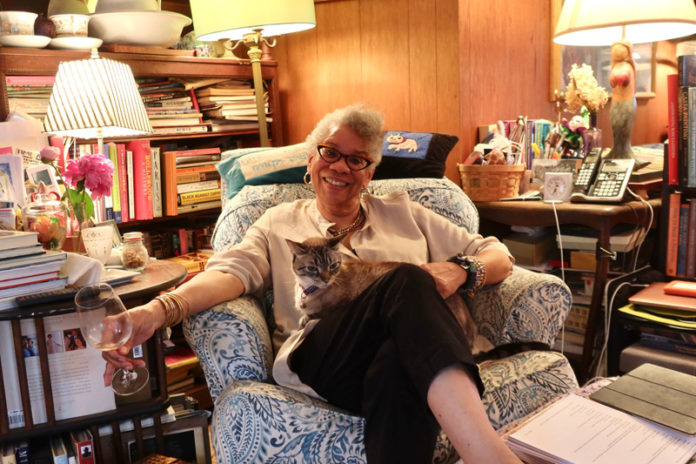I met Dr. Jessica B. Harris in 2005 when we were both part of a food writers’ dinner at the Harbor View Hotel. She had a book coming out, “The Martha’s Vineyard Table,” and mine, “Vineyard Harvest,” had just come out. Since that meeting, I have become a huge admirer and, frankly, a fan, of this intelligent, extremely well-spoken, confident, and captivating woman who is hitting her stride and receiving well-deserved recognition in her 70s.
Harris — a professor, culinary historian, James Beard Foundation Lifetime Achievement Awardwinner, and recent Peabody Award recipient for the 2021 Netflix documentary “High on the Hog,” based on her book “High On the Hog: A Culinary Journey from Africa to America” — is a longtime seasonal Oak Bluffs resident. Tucked away in a Victorian cottage built in 1880 in the thick of Oak Bluffs sits a home her parents bought back in the 1950s, where Harris has spent summers ever since.
The cottage is warm and inviting, filled with books, art, and memories. On my recent visit, I was greeted at the front door by two very friendly Siamese-mix cats, Hannibal and Hatshepsut. As I opened the door, they rushed toward me.
“Don’t worry,” Harris laughed, “they won’t bolt; they know they have it good.”
I entered as the kitties competed for the first scratch. I obliged, and they were happy with all the attention.
This home is where the magic happens, and where Harris has written her books over the years. She was on deadline for her latest book when I visited, and I knew I was lucky to steal her away for a short chat to catch up on some of the exciting changes in her life.
TM: First, congratulations on the Peabody Award for your Netflix documentary, “High on the Hog,” as well as the James Beard Lifetime Achievement Award in 2020.
JH: It’s astounding, all of it, but especially because the book “High on the Hog” is 11 years old. I am finally a New York Times bestselling author after all these years. They are shooting the second season of “High on the Hog” this summer, and I will be shooting two episodes. I will be starting in New Orleans.
TM: You have been working on another book. Could you tell me a bit about this project?
JH: The working title is “Braided Heritage: An American Cookbook,” and it includes 90 recipes. The book is essentially that foundational food in America is a braid of Native American, European American — specifically the Spanish, the British, the Dutch, whom we always forget but they brought us many sweets, cookies, waffles, and doughnuts — and the fourth is the French, and, of course, African American.
TM: How did this book come about?
JH: This one started differently from any other book I have written because I was asked to write it through a conversation I had back in 2018 with a higher-up at the publisher, Clarkson Potter. This book has been difficult. We signed contracts in 2019, and of course everything changed [with the pandemic], and my main goal was not writing a book — it was to stay alive.
TM: What is something surprising you have discovered while researching and writing this book?
JH: My surprise is how siloed our history is. I had no step-back picture of European history that then brought us to American history. In some ways, it was the learning, or relearning, the history and the aligning of the history I knew.
TM: When did you realize history was your path?
JH: I have always been an insatiable, voracious reader. My parents encouraged it. My parents were extraordinarily aspirational parents to me. They were older when they had me, 35, practically geriatric in those days. They had a full life before me, so when I was born, the focus was on me. It was a gift that I keep trying to repay.
TM: Where did you grow up?
JH: I grew up in Queens. My father had what was probably considered a good government job, and my mother was an administrative assistant. There’s a saying that African Americans are middle income, never middle class, meaning a lot of aspirational people have aspirations that far exceed the middle class. I went to Bryn Mawr College, the class of 1968. I went to a United Nations international school, I went to a private nursery school.
This past May, I just had the supreme honor of speaking at the class of 2022 Bryn Mawr commencement. Talk about pressure — giving the commencement address where you went to school, there is no greater pressure. I was told I did well.
TM: Is there any cuisine or ingredient that you’re excited about right now?
JH: I am excited about what’s going on around Native American food. I think there is mounting interest. There was a great film called “Gather,” about Native Americans trying to reclaim cultural identities through food. I would hope there is an opening. This is a nation of culinary omnivores; I would like to see more of this food and culture.
TM: Do you think we are more comfortable these days talking about people of color and food?
JH: I think we are thinking differently, whether it is more and continuing fallout from George Floyd, or what. For example, I noticed the James Beard Awards for 2022 had a considerable number of people of color, and not what the Beards have been. I went to the first five James Beards Awards; it was quite small when it started.
When I was inducted in 2020, I spoke about how I started in food when food wasn’t cool. None of my cookbooks were ever nominated. There is a whole new crop of people who this is what they do. It was always my hobby, I had a full-time job teaching for 50 years! Everything that got published I did while I was working full-time. It’s a career path now, with much more diversity.
TM: Do you have favorite restaurants on the Island?
JH: I go to the same few places. I do wish we had more nice restaurants that look at the water — not just casual-style restaurants, which seem to have all the water views. I do not need complicated food. I am of the “Cheers” mentality, where I am treated well as a regular customer.
Dr. Jessica B. Harris will be at Islanders Write, which takes place from July 30 to August 1, with Bon Appetit editor-in-chief and seasonal resident Dawn Davis.


